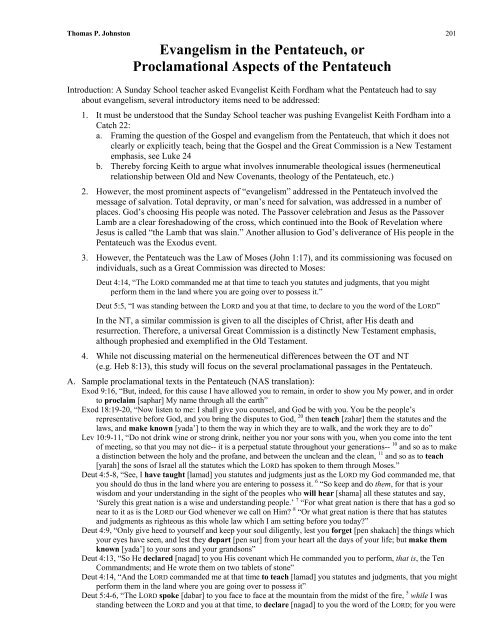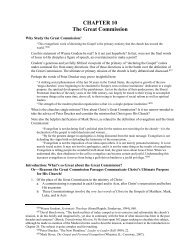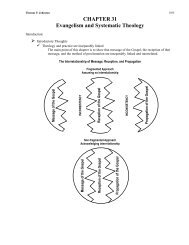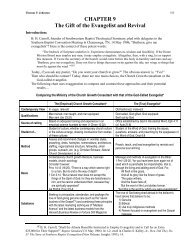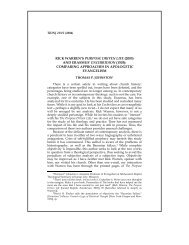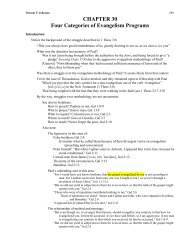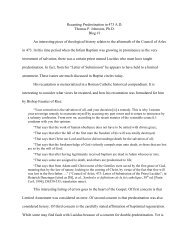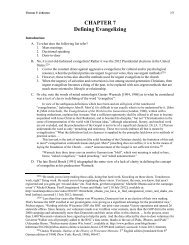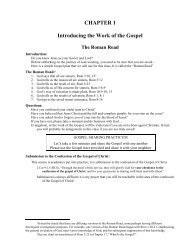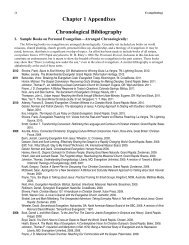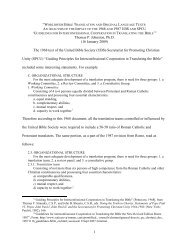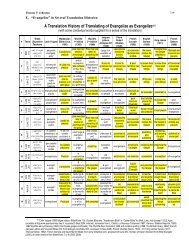Motivations and Urgency of Evangelism - Evangelism Unlimited
Motivations and Urgency of Evangelism - Evangelism Unlimited
Motivations and Urgency of Evangelism - Evangelism Unlimited
You also want an ePaper? Increase the reach of your titles
YUMPU automatically turns print PDFs into web optimized ePapers that Google loves.
Thomas P. Johnston 201<br />
<strong>Evangelism</strong> in the Pentateuch, or<br />
Proclamational Aspects <strong>of</strong> the Pentateuch<br />
Introduction: A Sunday School teacher asked Evangelist Keith Fordham what the Pentateuch had to say<br />
about evangelism, several introductory items need to be addressed:<br />
1. It must be understood that the Sunday School teacher was pushing Evangelist Keith Fordham into a<br />
Catch 22:<br />
a. Framing the question <strong>of</strong> the Gospel <strong>and</strong> evangelism from the Pentateuch, that which it does not<br />
clearly or explicitly teach, being that the Gospel <strong>and</strong> the Great Commission is a New Testament<br />
emphasis, see Luke 24<br />
b. Thereby forcing Keith to argue what involves innumerable theological issues (hermeneutical<br />
relationship between Old <strong>and</strong> New Covenants, theology <strong>of</strong> the Pentateuch, etc.)<br />
2. However, the most prominent aspects <strong>of</strong> “evangelism” addressed in the Pentateuch involved the<br />
message <strong>of</strong> salvation. Total depravity, or man’s need for salvation, was addressed in a number <strong>of</strong><br />
places. God’s choosing His people was noted. The Passover celebration <strong>and</strong> Jesus as the Passover<br />
Lamb are a clear foreshadowing <strong>of</strong> the cross, which continued into the Book <strong>of</strong> Revelation where<br />
Jesus is called “the Lamb that was slain.” Another allusion to God’s deliverance <strong>of</strong> His people in the<br />
Pentateuch was the Exodus event.<br />
3. However, the Pentateuch was the Law <strong>of</strong> Moses (John 1:17), <strong>and</strong> its commissioning was focused on<br />
individuals, such as a Great Commission was directed to Moses:<br />
Deut 4:14, “The LORD comm<strong>and</strong>ed me at that time to teach you statutes <strong>and</strong> judgments, that you might<br />
perform them in the l<strong>and</strong> where you are going over to possess it.”<br />
Deut 5:5, “I was st<strong>and</strong>ing between the LORD <strong>and</strong> you at that time, to declare to you the word <strong>of</strong> the LORD”<br />
In the NT, a similar commission is given to all the disciples <strong>of</strong> Christ, after His death <strong>and</strong><br />
resurrection. Therefore, a universal Great Commission is a distinctly New Testament emphasis,<br />
although prophesied <strong>and</strong> exemplified in the Old Testament.<br />
4. While not discussing material on the hermeneutical differences between the OT <strong>and</strong> NT<br />
(e.g. Heb 8:13), this study will focus on the several proclamational passages in the Pentateuch.<br />
A. Sample proclamational texts in the Pentateuch (NAS translation):<br />
Exod 9:16, “But, indeed, for this cause I have allowed you to remain, in order to show you My power, <strong>and</strong> in order<br />
to proclaim [saphar] My name through all the earth”<br />
Exod 18:19-20, “Now listen to me: I shall give you counsel, <strong>and</strong> God be with you. You be the people’s<br />
representative before God, <strong>and</strong> you bring the disputes to God, 20 then teach [zahar] them the statutes <strong>and</strong> the<br />
laws, <strong>and</strong> make known [yada’] to them the way in which they are to walk, <strong>and</strong> the work they are to do”<br />
Lev 10:9-11, “Do not drink wine or strong drink, neither you nor your sons with you, when you come into the tent<br />
<strong>of</strong> meeting, so that you may not die-- it is a perpetual statute throughout your generations-- 10 <strong>and</strong> so as to make<br />
a distinction between the holy <strong>and</strong> the pr<strong>of</strong>ane, <strong>and</strong> between the unclean <strong>and</strong> the clean, 11 <strong>and</strong> so as to teach<br />
[yarah] the sons <strong>of</strong> Israel all the statutes which the LORD has spoken to them through Moses.”<br />
Deut 4:5-8, “See, I have taught [lamad] you statutes <strong>and</strong> judgments just as the LORD my God comm<strong>and</strong>ed me, that<br />
you should do thus in the l<strong>and</strong> where you are entering to possess it. 6 “So keep <strong>and</strong> do them, for that is your<br />
wisdom <strong>and</strong> your underst<strong>and</strong>ing in the sight <strong>of</strong> the peoples who will hear [shama] all these statutes <strong>and</strong> say,<br />
‘Surely this great nation is a wise <strong>and</strong> underst<strong>and</strong>ing people.’ 7 “For what great nation is there that has a god so<br />
near to it as is the LORD our God whenever we call on Him? 8 “Or what great nation is there that has statutes<br />
<strong>and</strong> judgments as righteous as this whole law which I am setting before you today?”<br />
Deut 4:9, “Only give heed to yourself <strong>and</strong> keep your soul diligently, lest you forget [pen shakach] the things which<br />
your eyes have seen, <strong>and</strong> lest they depart [pen sur] from your heart all the days <strong>of</strong> your life; but make them<br />
known [yada’] to your sons <strong>and</strong> your gr<strong>and</strong>sons”<br />
Deut 4:13, “So He declared [nagad] to you His covenant which He comm<strong>and</strong>ed you to perform, that is, the Ten<br />
Comm<strong>and</strong>ments; <strong>and</strong> He wrote them on two tablets <strong>of</strong> stone”<br />
Deut 4:14, “And the LORD comm<strong>and</strong>ed me at that time to teach [lamad] you statutes <strong>and</strong> judgments, that you might<br />
perform them in the l<strong>and</strong> where you are going over to possess it”<br />
Deut 5:4-6, “The LORD spoke [dabar] to you face to face at the mountain from the midst <strong>of</strong> the fire, 5 while I was<br />
st<strong>and</strong>ing between the LORD <strong>and</strong> you at that time, to declare [nagad] to you the word <strong>of</strong> the LORD; for you were


